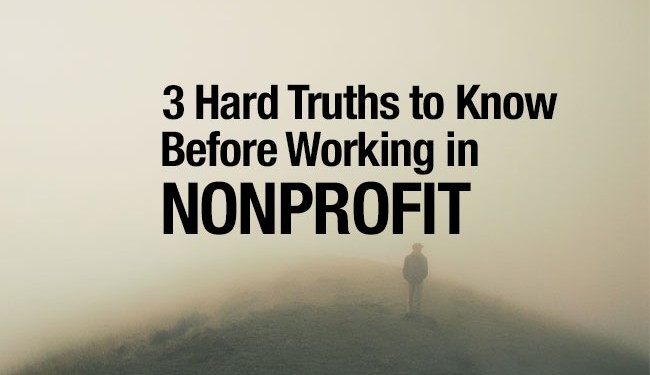3 hard truths to know before working in nonprofit
Many professionals want to work in the nonprofit sector and while it can be an incredibly rewarding experience, there are some important realities you should know about before taking your first nonprofit job. Whether you are just graduating, in the middle or twilight of your corporate career or somewhere in between, it’s important that you know what you’re getting into before making the big jump. Knowing what your challenges are will make you prepared for the experience ahead and make it easier to adapt to your new work environment.
Here are 3 hard truths you should know before working in nonprofit:
1. You need to be comfortable with change, ambiguity and uncertainty.
If you’re used to working in a startup or an environment that is constantly changing, than the nonprofit sector may not be as big of a transition. But for someone who is not used to this type of work environment, it can be an uncomfortable adjustment. Priorities, along with funding sources can change in an instant and the most successful nonprofit employees are flexible, resilient and able to adjust course accordingly. To excel in a nonprofit job, you must be comfortable with ambiguity and to an extent be excited by the unknown.
2. There are compensation constraints
Compensation constraints is one of the biggest factors that discourage professionals from pursuing careers in the nonprofit sector. While charities understand the need for top talent and the importance of paying for that- often only the larger ones are in the position to do so (and it is usually the senior positions). For most professionals, especially those early in your career, you need to expect that the salary won’t match that of a corporate job. Other traditional compensation strategies like bonuses, commissions and annual salary increases are not common. Part of the challenge is the reliance on external funding and the focus on not spending on overhead (which salary is a part of). While there is a movement to not evaluate a charity solely on their overhead ratio, the current reality is not quite there yet. The overhead ratio continue to be a leading evaluation measure and an area of tension for nonprofits in the war on talent.
See related: Can you Make Money in a Meaningful Job
3. Not every day is meaningful
Although it can be extremely fulfilling working on a cause you believe in- whether it’s women’s rights, children’s health, the environment etc.- your every day tasks may not always be related to the content of the mission. The daily realities of working in a nonprofit job are not that dissimilar from those of working in a for profit job, that can unfortunately mean office politics and challenging bosses. Additionally, it can sometimes be hard to see the immediate impact of your work because many of the changes you are working toward are long-term. As such, you have to be comfortable with small incremental wins and recognize how your role is contributing to something greater in the long-run.
Being connected to a mission you believe in and working with like-minded individuals is not only satisfying on a personal level, but also professionally. The nonprofit sector needs top talent dedicated to making a difference (read you)- but it’s not for everyone. For those who are excited to start their journey in this sector, you are in good company. Knowing the hard truths will make your experience easier to manage and more meaningful than you can imagine.
Did we miss anything? Are there other truths you think are important to share before transitioning to the nonprofit sector?





No Comment